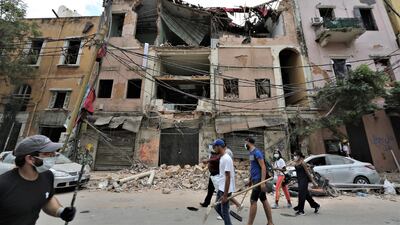The International Monetary Fund said it is ready to double down on efforts to help Lebanon handle its current crisis but urged the country's leaders to implement necessary reforms to access assistance worth billions of dollars.
“Over the last months we have been engaged intensely with the Lebanese authorities, as well as with civil society and the international community, on a reform package aimed at addressing the deepening crisis, strengthening governance and accountability, and restoring confidence in the economy. Unfortunately these discussions have yet to yield results," Kristalina Georgieva, managing director of the IMF, said following a high-level donor conference on Sunday.
“We are ready to redouble our efforts. But we need unity of purpose in Lebanon—we need all institutions to come together determined to carry out much-needed reforms."
Lebanon has been reeling from a massive explosion, blamed on 2,750 tonnes of ammonium nitrate housed in a warehouse, which killed more than 150 people and wounded 6,000. The damage from the blast, which rocked the capital Beirut and was heard as far away as Cyprus, ranges between several billion dollars to as high as $15 billion (Dh55bn), according to various estimates.
Prior to the explosion, Lebanon was in talks with the IMF for a $10bn bailout package but negotiations stalled.
The IMF listed a number of reforms that the country needs to implement in order to access funding.
The multilateral lender said Lebanon should restore the solvency of public finances and the soundness of its financial system to protect the savings of Lebanese depositors.
"Those who benefited from past excessive returns need to share the burden of bank recapitalisation," the lender said.
The IMF also urged the country to put temporary controls in place to avoid continued capital outflows through reforms to its banking sector.
"This includes adopting legislation to formalise capital controls in the banking system and eliminate the current multiple exchange rate system to help protect Lebanon’s international reserves while reducing rent-seeking and corruption."
The country should also look to cut losses across its state-owned enterprises through comprehensive audits of key institutions, including the central bank, the IMF said. Lebanon's electricity company saps government coffers of about $2bn annually.
The Washington-based lender added that an expanded social safety net should also be put in place to protect the most vulnerable sections of the society.
"Commitment to these reforms will unlock billions of dollars for the benefit of the Lebanese people. This is the moment for the country’s policymakers to act decisively. We stand ready to help,” Ms Georgieva said.
More than 30 international leaders and government officials participated in a virtual aid conference organised by France and the United Nations on Sunday to raise funds to help Lebanon.
Many countries have already extended assistance to Lebanon. The UK pledged £20 million (Dh95.8m), while Germany pledged €10m (Dh43.3m) towards the reconstruction of the blast-hit city. The European Commission on Sunday committed €30m to help the country.
Proper oversight of how aid will be disbursed in an effort to ensure the funds are not lost to corruption is a key goal of donors and Lebanese protesters.
"Ensuring an efficient and coordinated response in the aftermath of this catastrophic explosion is critical," Axel van Trotsenburg, the World Bank's managing director of operations, said.
About "45 per cent of Lebanese citizens live in poverty. With so many left behind, it comes as no surprise that people in Lebanon are calling for profound reforms that will address the core problems of these crises and provide a real possibility for improving the daily lives of the average Lebanese citizen."
Lebanon has one of the highest debt-to-GDP ratios in the world. The Lebanese pound, which has been pegged to the dollar since 1997, has plunged more than 80 per cent since the start of the year, while inflation soared to 90 per cent in June from a year earlier and unemployment is on the rise.
The World Bank said it began a Rapid Damage and Needs Assessment last Thursday that may help serve as a basis for the country's reconstruction plan.
"In the short term, and if the government is willing to move quickly, we can finalise preparation of an emergency social protection program of over $200m that could benefit over half a million of poor people," Mr Trotsenburg said.
"We stand ready to work on a fast-track basis and engage on the reform agenda that will help ease the suffering of the people of Lebanon."


